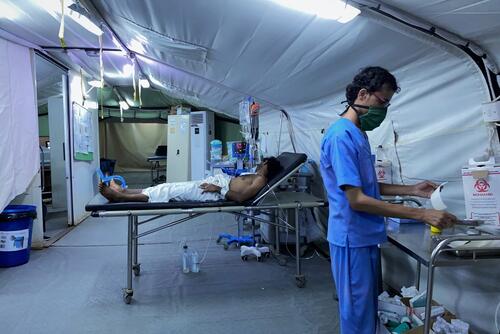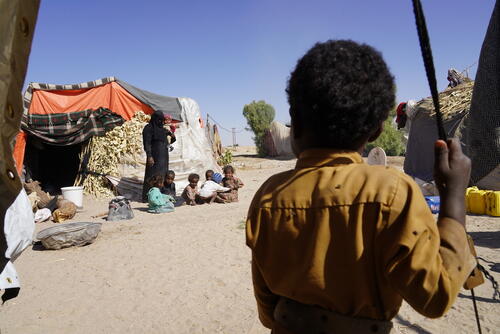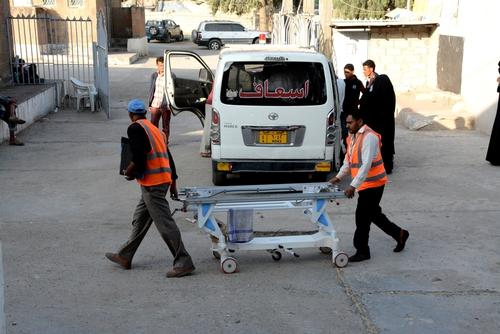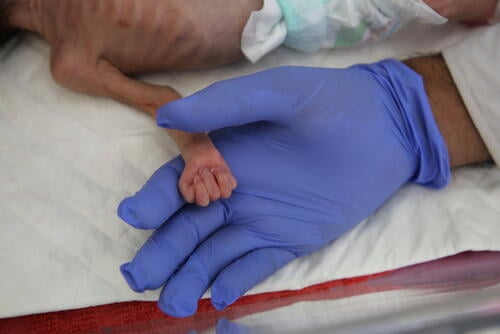MSF teams have treated 163 patients with shrapnel, blast and other conflict-related injures at our trauma hospital in Mocha, Yemen between 8 and 28 November. Conflict in the area has heavily intensified, raising urgent concerns for the health and safety of people, as well as the capacity of the health system to cope with influxes of conflict-related injuries.
“We’ve responded to two mass casualty events in the last few weeks,” says Miodrag Jevtovic, MSF head of mission in Aden. “In each case, more than 30 patients have arrived in a short timeframe from front-line areas, and we’ve expanded our capacity so we can continue to cope with large influxes of war-wounded patients.”
“But other medical facilities close to front-line areas also tell us they have been overwhelmed with the numbers of patients admitted,” says Jevtovic.
As conflict escalated in mid-November, the MSF team began responding to large influxes of wounded patients. On 12-13 November, teams received 34 wounded in two days and surgical teams worked around the clock to perform 20 surgeries in a single day.
The following week, a second mass influx of 45 patients arrived to the hospital, including seven in critical condition. We performed 24 surgeries in response. Of the 163 patients received by MSF since 8 November, 96 have arrived in a serious or critical condition.
Patients are coming to us from front-line areas and have included residents who tell us they were caught in shelling or crossfire, and whose family members have struggled to find them after their loved ones were referred to hospital. Such was the case for Sahar, a resident of Al-Tuhayta district, whose elderly father Ayyash was injured.
“My father had been missing for nearly eight days, and we were looking for him. We tried to ask the villagers about him, and some told us that he was among the wounded,” said Ayyash.
Ayyash undertook a long journey down a road known for landmines to finally find his father at the MSF hospital in Mocha. His father had been wounded but when Ayyash arrived to the hospital in Mocha he was relieved to find his father recovering well after surgery.
“I did not expect to find my father alive,” said Ayyash.
Another resident, Yassin from Al-Nakhla, told MSF he was in his barn when it was suddenly hit by an explosion.
“That was like any morning I had for the past 70 or 80 years of my life, until a mortar shell suddenly landed right in in barn. At the very first moment, I couldn’t feel my leg,” says Yassin. “Thank God, no one else in my family was injured, though I lost all of my cows and sheep.”
“My family and I chose to live for so many years in the countryside for the sake of safety and security and because we work with livestock,” said Yassin. “My leg was damaged a lot and I thought I could lose it. Now after the surgery I’m optimistic but I still need to go to Aden to complete the treatment and install a plate for it.”
As the conflict continues in southwest Yemen, MSF continues to receive more wounded each week, raising urgent concerns for the health and safety of people which has already been affected by years of conflict and displacement.
“This is just the latest episode in a years-long conflict and humanitarian crisis in southwest Yemen, and we are deeply concerned for people who have already been through so much,” says Jevtovic.
MSF has been operating a surgical field hospital in Mocha since 2018 in response to the conflict-related medical needs of the population in southwest Yemen. MSF operates projects across Yemen to provide healthcare to populations affected by conflict, outbreaks and other medical needs. MSF adheres to humanitarian principles of humanity, neutrality, independence and impartiality and does not accept any funding from foreign governments for its medical activities in Yemen.






